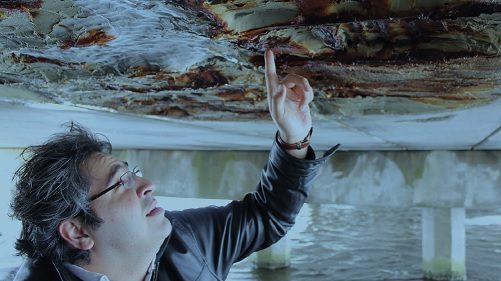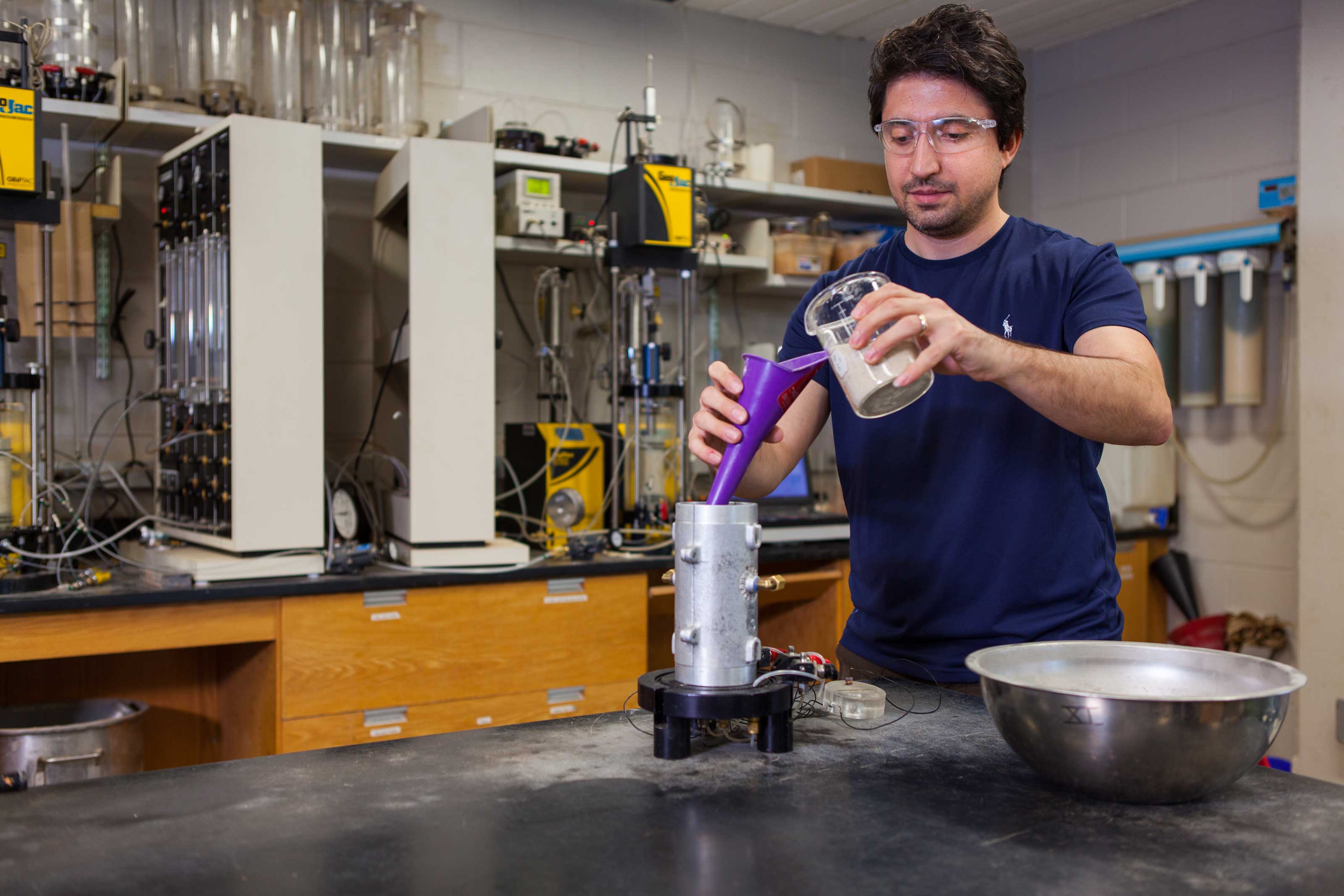Mechanics and Materials

We are working towards the common goal of understanding, modeling, and improving a wide spectrum of traditional and emerging materials, using theoretical, experimental, and computational mechanics from nano to macro scale.
Focus Areas
Theoretical mechanics
- Constitutive modeling – viscoelasticity, plasticity, viscoplasticity
- Damage mechanics, fracture, and fatigue
- Mechanics of porous media
- Crystal mechanics
- Scaling theories
- Finite plastic deformation
Experimental Mechanics
- Micromechanics – nanoindentation, nano scratch, and rheometry
- Durability and damage mechanics
- Chemo-mechanics
- Low- and high-cycle fatigue, fracture, permanent deformation
- Integration of material, component, and system testing
- Nondestructive evaluation
Computational Mechanics
- Finite element analysis and related methods
- Inverse problems and optimization
- Data-driven methods and machine learning
- Multiscale modeling – hierarchical and concurrent
Applications to specific materials
- Asphalt and asphalt concrete
- Cementitious materials and concrete
- Composites – fiber-reinforced polymers
- Geological materials – shale, sandstone, carbonates, and soil
- Metals and alloys – single crystals and polycrystalline materials
- Sustainable bio-materials
Faculty
- Ange Therese Akono
- Cassie Castorena
- Murthy Guddati
- Abhinav Gupta
- Ghadir Haikal
- Tasnim Hassan
- Youngsoo Richard Kim
- Brina Montoya
- Jason Patrick
- Mo Pourghaz
- Shane Underwood
- Andrew Ziccarelli
Our research in action:

Dr. Mohammad Pour-Ghaz examines the deteriorated bridge slabs.

Graduate research assistant preparing a soil specimen for testing.

Visualizing moisture flow in fractured concrete using advanced electrical imaging technology.
Facilities and Centers
- Constructed Facilities Laboratory (CFL)
- Structural Engineering and Materials Labs
- Geotechnical Engineering Lab
- Nanomechanical Testing Facility
- Integrated Materials and Component Testing Laboratory (iMCTL)
- Asphalt Materials and Testing Laboratory
- Virtual Computing Laboratory (VCL)
- Center for High-Performance Computing
- Analytical Instrumentation Facility (AIF)
- NCSU Nanofabrication Facility
Graduate Course Requirements
The Master of Science (MS) degree requires a minimum of 30 semester hours of graduate study including up to 6 credit hours for a thesis and a final oral examination. Every student is expected to work closely with his/her academic advisor to develop a well-coordinated plan of coursework to supplement and complement their research.
The Doctor of Philosophy (Ph.D.) degree normally includes one academic year of full-time coursework beyond the master’s degree. The major component of the Ph.D. program is the preparation of a dissertation reporting the results of an original investigation that represents a significant contribution to knowledge.
Graduate Courses
Primary Courses – Mechanics of Materials
| Course Number | Course Name |
| CE 515 | Advanced Strength of Materials |
| CE 714 | Stress Waves |
| CE 718 | Constitutive Modeling of Engineering Materials |
| CE 741 | Geomechanics of Stress Deformation |
| CE 742 | Deformation and Instability of Soils |
| CE 759 | Inelastic Behavior of Construction Materials |
| CE 794 | Advanced Topics in Structures and Mechanics |
| MAE 543 | Fracture Mechanics |
| MAE 730 | Modern Plasticity |
| PY 543 | Introduction to the Structure of Solids |
Primary Courses – Computational Methods and Mathematics
| Course Number | Course Name |
| CE 526 | Finite Element Method in Structural Engineering |
| CE 536 | Introduction to Numerical Methods for Civil Engineers |
| CE 721 | Advanced Finite Element Methods |
| CE 793N | Modeling and Computing for Geotechnical Engineering |
| MA 501 | Advanced Mathematics for Engineers and Scientists I |
| MA 502 | Advanced Mathematics for Engineers and Scientists II |
Primary Courses – Materials Behavior and Engineering
| Course Number | Course Name |
| CE 548 | Engineering Properties of Soils I |
| CE 594 | Properties of Concrete and Advanced Cement-Based Composites |
| CE 595 | Bituminous Materials |
| CE 595 | Multiscale Characterization of Asphalt Materials |
| CE 751 | Theory of Concrete Mixtures |
| CE 790 | Advanced Topics in Civil Engineering |
| CE 793B | Physicochemical and Biological Aspects of Soil Behavior |
| CE 794 | Modeling Behavior of Infrastructure Materials |
Related Courses
| Physical Properties Of Fiber Forming Polymers, Fibers, and Fibrous Structures | Course Name |
| CE 522 | Theory and Design of Prestressed Concrete |
| CE 523 | Theory and Behavior of Steel Structures |
| CE 524 | Analysis and Design of Masonry Structures |
| CE 528 | Structural Design in Wood |
| CE 529 | FRP Strengthening and Repair of Concrete Structures |
| CE 537 | Computer Methods and Applications |
| CE 549 | Soil and Site Improvement |
| CE 594C | Nondestructive Evaluation of Civil Infrastructure |
| CE 724 | Probabilistic Methods of Structural Engineering |
| CE 726 | Advanced Theory of Concrete Structures |
| CE 737 | Computer-Aided Engineering Systems |
| CE 744 | Foundation Engineering |
| CE 746 | Soil Dynamics and Earthquake Engineering |
| CE 747 | Geosynthetics in Geotechnical Engineering |
| CE 755 | Highway Pavement Design |
| CE 757 | Pavement Management Systems |
| BAE 528 | Biomass to Renewable Energy Processes |
| BME 550 | Medical Imaging: Ultrasonic, Optical, and Magnetic Resonance Systems |
| BME (TE) 566 | Polymeric Biomaterials Engineering |
| MA 513 | Introduction to Complex Variables |
| MA 520 | Linear Algebra |
| MA 573 | Mathematical Modeling of Physical and Biological Processes I |
| MA 574 | Mathematical Modeling of Physical and Biological Processes II |
| MAE 531 | Engineering Design Optimization |
| MAE 536 | Micro/Nano Electromechanical Systems |
| MAE 537 | Mechanics of Composite Materials |
| MAE (MSE) 539 | Advanced Materials |
| MAE 546 | Photonic Sensor Applications in Structure |
| MSE 531 | Physical Metallurgy |
| MSE 540 | Processing of Metallic Materials |
| MSE 545 | Ceramic Processing |
| MSE 555 | Polymer Technology and Engineering |
| MSE 556 | Composite Materials |
| MSE 712 | Principles of Corrosion |
| MSE 741 | Introduction to Nanomaterials |
| PY 511 | Mechanics I |
| PY 512 | Mechanics II |
| PY 519 | Biological Physics |
| PY 525 | Computational Physics |
| PY (TE) 570 | Polymer Physics |
| PY 753 | Introduction To the Structure Of Solids II |
| SSC 511 | Soil Physics |
| SSC 521 | Soil Chemistry |
| SSC 532 | Soil Microbiology |
| TE (TT) (TTM) 533 | Lean Six Sigma Quality |
| TE (BME) 566 | Polymeric Biomaterials Engineering |
| TMS 500 | Fiber and Polymer Microscopy |
| TMS (TE) 565 | Textile Composites |
| TMS 761 | Mechanical and Rheological Properties Of Fibrous Material |
| TMS 762 | Physical Properties Of Fiber Forming Polymers, Fibers and Fibrous Structures |
| TMS (MSE) 763 | Physical Properties Of Fiber Forming Polymers, Fibers, and Fibrous Structures |